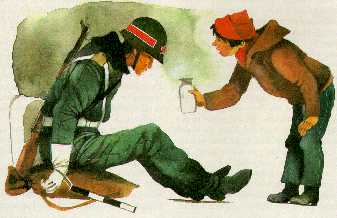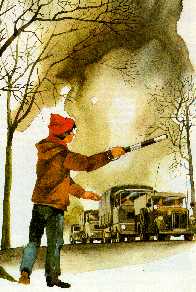



Background: The GDR encouraged interest in the military at an early age. This is one of seven stories from a 1985 East German book for children that presented the military in a favorable light.
The source: Die sieben Brüder (Berlin: Verlag Junge Welt, 1985), pp. 5-9
by Walter Flegel
Jan Krüger is the smallest boy in his sixth grade class. The others call him “shrimp” and treat him that way, too. They do not make fun of him, nor do they reject him. But Jan knows that they only put up with him. They do not know how to treat him because they do not think he can do anything.
That bothers Jan. It depresses him. He feels lonely. He dreams of adventures in which he does great deeds, and his dreams always end with his classmates wanting his friendship.
But in the sixth grade, these dream adventures remain dreams. It is crazy to hope for them, so Jan does what he had always done in the fourth and fifth grades: he learns, and he learns well. But then November comes, and along with it the fog and rain, which not only wipe the leaves from the trees, but causes the dreams of adventures and heroic deeds to disappear from Jan’s soul. It has rained for days and days without a break, for so long that everyone has become used to the rain. Even Jan. It is as if there is an important game being played out between earth and sky that one may not disturb through hurry or noise.
Jan is on his way to school when he arrives at the intersection at the outskirts of town. In November it is empty and deserted, like the beaches of the Baltic Sea to which the highway leads.

The military traffic policeman is still standing at the intersection. It has been raining for so long that Jan does not know who was there first, the military traffic policeman or the rain. He knows only that it is the same soldier who stands before the milestone with his traffic baton. His white helmet with the red stripes gleams freshly, and the reflectors which adorn his belt shine as if they are holding on to a bit of sunlight. But the blue uniform and boots of the soldier are darker than they were yesterday, and heavy with moisture. And the backpack that lies on the stones at his feet has completely collapsed. Many military traffic policemen have stood here, but never one for so long.
Jan crosses the intersection, nods to the soldier, and stands before him. The soldier smiles, and Jan knows his slanting eyes in the round and friendly face. He would like to stand quietly here next to the soldier, so that he would no longer be alone. The soldier shakes his head, as if he had read Jan’s mind. Then he taps his watch with his traffic baton and says “Skola, Skola. Davai!” His voice is hoarse, perhaps because it had been so long since he had spoken a word.
“Davai!” he repeats, and Jan nods. He has to go to school, but before he goes he opens his school pack, grabs the plastic bag with three thick slices of bread and lays them quickly under the bag at the soldier’s feet. “Spasibo!” calls the soldier after Jan. He sounds hoarse and scratchy.
“Spasibo! Davai!”
Jan thinks about the military traffic policeman all day. He imagines him alone, unmoving from his position. Day and night in rain, waiting for the columns to whom he must show the way. It seems to Jan that school never lasted this long before. He thinks and worries about the military traffic policeman. The soldier could be hoarse because he has not spoken for such a long time. Or he could be hoarse because he has a cold. Had he eaten the bread already? How long has it been since he has eaten or drunk anything?
Jan starts paying attention in Russian class with Mr. Billenbach. During
the break his teacher translates words they have not yet learned, and
Jan writes them in his notebook. As Jan again reached the intersection,
the military traffic policeman is nowhere to be seen. It is still raining
constantly and quietly. The intersection is even more deserted now. Everything
was in vain. The questions and worries that Jan had, the Russian words
in his notebook, the bottle of milk in his schoolbag were all unnecessary.
Too bad. Jan walks slowly across the intersection. At the right, where
the road leaves the woods and goes along the outskirts of town, Jan hears
the sound of many motors. He listens and perceives, ever clearer and nearer,
the powerful and dull droning, and an intense clatter. Tanks? In any case,
it is an army column of some sort, with tanks and rocket launchers. They
near the intersection with closed hatches, wet and dirty. They seem tired.
Suddenly the military traffic policeman is there. Jan waves to him, but
the soldier does not react. The soldier looks to Jan like he was staggering,
and with great difficulty he lifts his arm and points in the direction
of the highway. It takes a long time for the army to pass through the
intersection. The soldier really wobbles as he staggers toward the milestone.
He sits down slowly, as if he were being spun around by threads of rain.
He sits on his empty backpack. He had eaten the bread Jan had given him.
The soldier covers himself with a rain tarp and leans back against the
milestone. Jan takes the bottle of milk out of his bag and throws away
the cover. The soldier gulps the milk hastily, keeping his eyes closed.
His face is wet and pale with a yellowish tint. It is hot, and Jan dries
it with his clean handkerchief. The soldier shivers like in winter, and
his teeth chatter. Suddenly Jan hears more motors approaching loudly and
quickly. Helplessly Jan looks around. He shakes the soldier, but he cannot
be roused. He only nods and smiles and begins to sing. With a deep voice
he sings a foreign melody that is quickly drowned out by the noise from
the motors. Jan looks around again, shakes the soldier, then takes the
black and white stick from the soldiers wrist and races to the middle
of the intersection. The first vehicle of the column was a jeep with two
long antennas that cut through the streams of rain. As it turns into the
intersection, Jan waves the stick in the direction of the highway, and
the vehicle stops in front of him. An officer of the People’s Army of
Czechoslovakia jumps out, looks around, pats Jan on the head and runs
to the soldier. They radio for help, as Jan continues to stand before
the car and hold the stick in the right direction. A few moments later
there is a siren, and an ambulance overtakes the column and speeds into
the intersection. A captain arrives with the ambulance who speaks German.
He pats Jan on the back and tells him that the column will immediately
travel further, and a new military traffic  policeman will come. The ambulance
is the first to leave the intersection. The commander of the column stands
before Jan and salutes him, climbs in the vehicle and leads the column
out of the city. Five minutes later Jan stands alone in the rain in the
middle of the intersection with the military traffic policeman’s baton
still in his hand. Before another column arrives, the new military traffic
policeman arrives. He is a tall blond Soviet soldier, who smells of warmth
and tobacco. He extends his hand to Jan. “Pawel,” he said, “so,
comrade military traffic policeman, how’s it going?” “Otschen
Karascho,” Jan says and tries to give him the baton. The soldier
shakes his head. “For you,” he says, “for you.” By
now the next column is nearing. Jan walks to the side of the street, but
Pawel pulls him back by his shoulder and places Jan in front of him. Almost
simultaneously they lift their batons. A column of the NVA [the
East German army] passes by.
policeman will come. The ambulance
is the first to leave the intersection. The commander of the column stands
before Jan and salutes him, climbs in the vehicle and leads the column
out of the city. Five minutes later Jan stands alone in the rain in the
middle of the intersection with the military traffic policeman’s baton
still in his hand. Before another column arrives, the new military traffic
policeman arrives. He is a tall blond Soviet soldier, who smells of warmth
and tobacco. He extends his hand to Jan. “Pawel,” he said, “so,
comrade military traffic policeman, how’s it going?” “Otschen
Karascho,” Jan says and tries to give him the baton. The soldier
shakes his head. “For you,” he says, “for you.” By
now the next column is nearing. Jan walks to the side of the street, but
Pawel pulls him back by his shoulder and places Jan in front of him. Almost
simultaneously they lift their batons. A column of the NVA [the
East German army] passes by.
Three days later, three officers enter classroom 6a, a Czech, a Soviet, and a German. Jan’s classmates learn for the first time from them of Jan’s experience with the military traffic policeman. The officers award Jan an NVA medal. The class is silent until the officers begin to applaud. The teachers and pupils join in the applause. All the attention and acclamation embarrass Jan, who blushes. The treat him like a hero. But he did not do anything heroic or have an adventure, but rather he did something completely normal, an everyday activity like learning or shopping. He helped someone. That is all.
Last edited 12 August 2024
Initial translation by Katherine Lynch. Page copyright © 2000 by Randall Bytwerk. My e-mail address is available on the FAQ page.
Go to the “Seven Brothers” Page.
Go to the GDR Page.
Go to the German Propaganda Archive Home Page.